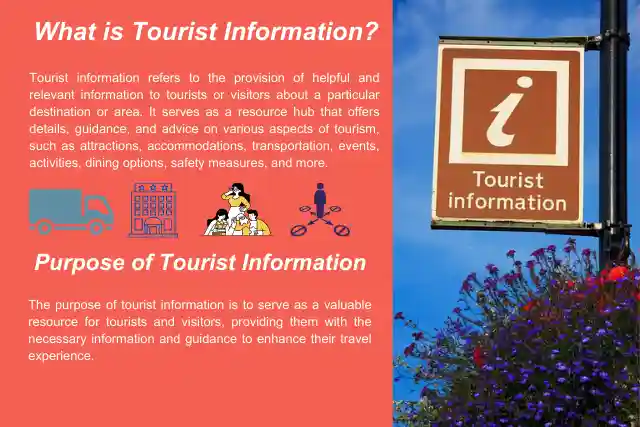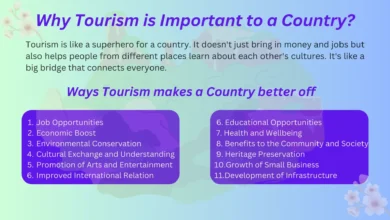
What is Tourist Information?
In this comprehensive guide, we will delve into the significance of tourist information and its role in enhancing the travel experience. Tourist information serves as an indispensable resource, offering vital guidance and information to ensure travelers make the most of their journeys.
We will explore how it provides essential navigation assistance, promotes safety measures, fosters cultural understanding, facilitates trip planning, offers local recommendations, shares event information, provides accessibility details, and contributes to the economic growth of destinations. Join us as we uncover the multitude of reasons why tourist information is crucial for a positive and fulfilling travel experience.
Tourist Information
Tourist information refers to the provision of helpful and relevant information to tourists or visitors about a particular destination or area. It serves as a resource hub that offers details, guidance, and advice on various aspects of tourism, such as attractions, accommodations, transportation, events, activities, dining options, safety measures, and more. Tourist information centers or offices, often located in popular tourist areas, are commonly established to cater to the needs of travelers.
Purpose of Tourist Information
The purpose of tourist information is to serve as a valuable resource for tourists and visitors, providing them with the necessary information and guidance to enhance their travel experience. Some key purposes of tourist information are as follows:
Cultural Enrichment
Tourist information plays a crucial role in promoting cultural understanding and appreciation. It provides tourists with information about local traditions, historical sites, museums, festivals, and cultural events, allowing visitors to immerse themselves in the destination’s unique heritage.
Community Engagement
Tourist information centers often serve as hubs for local communities to connect with tourists. They facilitate interactions between visitors and local businesses, artisans, tour operators, and guides, fostering a sense of community involvement and economic empowerment.
Sustainable Tourism
Tourist information promotes responsible and sustainable tourism practices. It can educate visitors about environmentally friendly activities, conservation efforts, and initiatives that support the preservation of natural and cultural resources. It may also provide information about Eco-friendly accommodations, local products, and responsible travel operators.
Accessibility and Inclusivity
Tourist information strives to make travel accessible and inclusive for all individuals. It provides information about wheelchair accessibility, special needs services, accessible attractions, and accommodations, ensuring that tourists with disabilities or specific requirements can fully enjoy their visit.
Trip Planning
Tourist information helps individuals plan their trips by offering details about attractions, accommodations, transportation options, and activities available in a specific destination. It enables travelers to make informed decisions about where to go, what to see, and how to get there.
Orientation and Navigation
Tourist information provides maps, guides, and directions to help tourists navigate their way around a destination. It assists in identifying key landmarks, understanding transportation networks, and finding the most efficient routes.
Local Knowledge
Tourist information offices are staffed by knowledgeable personnel who possess a wealth of information about the destination. They can offer insights into local culture, customs, traditions, and recommend lesser-known attractions or hidden gems that may not be widely advertised.
Safety and Security
Tourist information ensures that visitors are aware of any safety precautions, potential risks, or specific regulations they should be mindful of during their stay. This includes information about emergency services, healthcare facilities, and any local laws or customs that may affect tourists.
Promotion of Attractions and Services
Tourist information plays a vital role in promoting tourism and supporting local businesses. It provides a platform to showcase attractions, events, accommodations, restaurants, and other services, thereby contributing to the economic growth of the destination.
Assistance and Support
Tourist information offices often offer assistance and support to travelers. They can help with booking accommodations, arranging transportation, addressing complaints or issues, and providing general guidance and recommendations.
Why is Tourist Information Important?
Tourist information is essential for visitors to navigate, stay safe, understand the local culture, find suitable accommodations and services, promote local attractions, and plan their trips effectively. It enhances the overall travel experience and contributes to the positive development of tourism destinations. Here are some reasons mentioned below.
Orientation
Tourist information helps visitors navigate and orient themselves in an unfamiliar destination. It provides essential details about transportation options, maps, landmarks, and local attractions. This information enables tourists to plan their itineraries, make informed decisions, and maximize their time and enjoyment during their visit.
Safety and Security
Tourist information provides valuable guidance on safety measures, potential risks, and local laws and customs. It helps visitors understand the dos and don’ts in a specific location, such as areas to avoid, common scams, and emergency contact numbers. This information promotes the safety and well-being of tourists, helping them have a trouble-free experience.
Cultural Understanding
Tourist information provides insights into the local culture, traditions, and customs. It offers details about museums, historical sites, festivals, and other cultural events. Understanding the local culture enhances visitors’ appreciation for the destination, promotes respectful behavior, and encourages meaningful interactions with the local community.
Accommodation and Services
Tourist information centers provide information about various accommodation options, including hotels, guesthouses, and vacation rentals. They also offer guidance on local services such as transportation, restaurants, shopping areas, and healthcare facilities. This information helps tourists make informed choices and ensures they have access to necessary amenities during their stay.
Promotion of Local Attractions
Tourist information centers play a vital role in promoting local attractions and lesser-known destinations. They provide brochures, maps, and recommendations to tourists, highlighting the unique features and experiences a destination has to offer. By raising awareness and showcasing the local attractions, tourist information contributes to the growth of tourism and the local economy.
Support for Travel Planning
Tourist information assists visitors in planning their trips effectively. It offers guidance on transportation options, best times to visit, weather conditions, and any special events or exhibitions taking place during their stay. This information allows tourists to make informed decisions about when and how to travel, optimizing their experience and ensuring they don’t miss out on important opportunities.
Local Recommendations
Tourist information centers are staffed with knowledgeable personnel who can provide valuable recommendations based on visitors’ preferences. They can suggest local restaurants, hidden gems, off-the-beaten-path attractions, and unique experiences that may not be easily found through online resources. These personalized recommendations enhance the authenticity of the travel experience and allow tourists to discover the destination from a local perspective.
Language Assistance
In foreign countries where the language barrier may pose a challenge, tourist information centers often offer language assistance services. They can provide translation support, help with communication, and offer phrasebooks or language guides. This assistance facilitates smoother interactions with locals, making travelers feel more comfortable and enabling them to navigate cultural differences more effectively.
Event and Activity Information
Tourist information centers keep tourists updated on local events, festivals, concerts, exhibitions, and other activities happening in the area. This information allows visitors to participate in cultural celebrations, attend performances, and engage in recreational or educational activities that align with their interests. It enriches their travel experience by providing opportunities to immerse themselves in the local community and create lasting memories.
Accessibility Information
Tourist information centers provide valuable accessibility information for travelers with disabilities or special needs. They offer details on wheelchair accessibility, accessible transportation options, and accessible attractions and accommodations. By providing this information, tourist information centers promote inclusivity and ensure that all visitors can enjoy a fulfilling and barrier-free travel experience.
Conclusion
Tourist information serves as an invaluable resource for travelers, providing essential guidance and information to enhance their travel experience. From navigation assistance and safety promotion to cultural understanding and local recommendations, tourist information plays a crucial role in ensuring a positive and fulfilling journey. By facilitating trip planning, supporting accessibility, and promoting local attractions, it contributes to the economic growth and development of tourism destinations. Overall, tourist information is an essential component of successful and enriching travel experiences.
You May like:
What is dark tourism and why is it so important?




